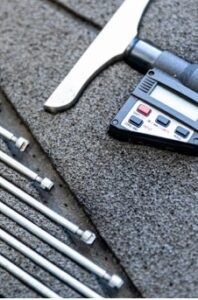Large diesel engines, powering everything from ships and generators to industrial machinery, play a vital role in various industries, such as maritime, mining and energy. Leading manufacturers of these large Diesel engines such as Wärtsilä, Sulzer, MAN, MAK, and CAT are all supported by OSM Atlantic’s service team. Other manufacturers supported by OSM Atlantic are MTU, Bergen, Daihatsu – to name a few. A list of manufacturers for whom OSM Atlantic offers services and high-quality spare parts is available here.
Large Diesel engines need regular maintenance in order to ensure best performance, reliability and longevity. Developing a comprehensive maintenance schedule will result in avoiding downtime, increasing performance, and reducing, ideally avoiding, costly repairs.
In this article, we outline key best practices for keeping these strong engines running.
Routine inspections are the basics of diesel engine maintenance. They start with regular visual inspections of the engine components, looking for signs of wear, leaks, and corrosion. OSM Atlantic uses advanced sensor technologies for analyzing key parameters such as temperature, pressure, oil quality, and vibration. This data-driven approach enables early detection of anomalies and allows for timely corrective action.
Proper lubrication is essential to reduce friction, wear, and heat generation within the engine. It is important to follow the manufacturer’s instructions regarding the type of lubrification and monitoring schedule. On site, inspect on a regular basis lubricant levels and oil quality.
Maintaining an efficient cooling system is crucial for preventing overheating and ensuring consistent performance, particularly for Diesel engines used in generators.
Regularly inspect and clean the radiator, intercooler, and peripheral components. Inspect coolant levels and the condition of coolant additives, and replace them when necessary. Immediately take care of any leaks to prevent damage to the engine and its peripheral components.
Quality fuel is a major element of any Diesel engine. We propose to use clean and properly treated fuel to prevent contamination that can lead to clogged injectors as well as reduced engine efficiency. Fuel filters and water separators need also to be inspected on a regular basis. Our inspection services also cover fuel injection pressures and timings - and, for sure, we calibrate the injection system according to the manufacturer's guidelines.
The air intake system has a direct impact on engine performance and fuel efficiency. Clean air filters are required to prevent dust and debris from entering the engine. The turbocharger also needs to be monitored for wear and proper functioning. A well-maintained air intake system promotes efficient combustion and reduces the risk of premature engine wear.
It is not a secret that Diesel engines have a bad reputation because of their CO2 emissions. However, there are ways to limit those emissions – while at the same time maintaining engine performance. In fact, the key is to make sure that exhaust systems are working properly. The exhaust manifold, turbocharger, and aftercooler need to be checked regularly for leaks, cracks, or corrosion. It is also important to monitor exhaust gas temperatures and emissions to ensure compliance with environmental regulations.
For backup generators and stationary engines, regular load bank testing is crucial. Load bank testing is an essential part of maintaining a generator. The test helps ensure that the generator can handle a full load and identifies potential problems during use. This type of testing is typically required every three years by NFPA110 standards.
Not familiar with this procedure? Load bank exercises simulate real operating conditions, making sure that the engine can handle its rated load and preventing issues related to underloading. Regular testing also helps identify potential problems that might arise during critical moments.
Draw up a comprehensive preventive maintenance schedule compliant with the manufacturer's recommendations. We can help you develop a checklist covering all essential maintenance tasks and intervals for your specific diesel engines. This proactive approach aims to prevent unexpected breakdowns, reduce downtime and extend engine life.
Maintaining a detailed log of all maintenance activities, including inspections, repairs, replacements, and test results allows the development of statistics, that can prevent costly repairs. This log provides insights into the engine's history, making it easier to identify patterns and make informed decisions regarding future maintenance strategies.
In conclusion, the maintenance of large diesel engines from manufacturers like Wärtsilä, Sulzer, MAN, MAK, and CAT demands a holistic and disciplined approach. Regular inspection, proper lubrication, cooling system maintenance, fuel quality management, and adherence to manufacturer guidelines are paramount. A combination of advanced monitoring technologies, skilled personnel, and comprehensive documentation will help ensure the optimal performance, longevity, and reliability of these industrial workhorses.
OSM ATLANTIC INSPECTION SERVICES
 OSM Atlantic’s inspection offering includes inspections according to the guidelines presented above as well as specific services such as
OSM Atlantic’s inspection offering includes inspections according to the guidelines presented above as well as specific services such as
These tasks require specific tools that we are bringing along on site or used in our workshop for large engine overhauls and cleaning.
Want to know more about our inspection services? Simply write us at [email protected] – we’ll get back to you quickly.